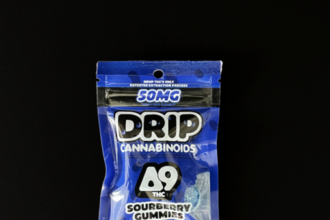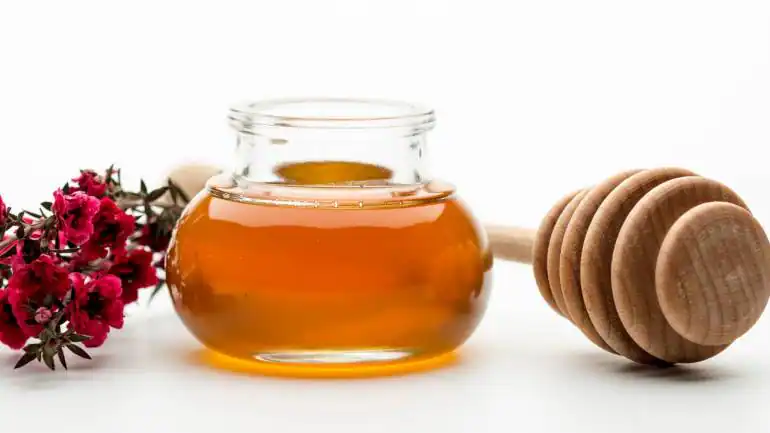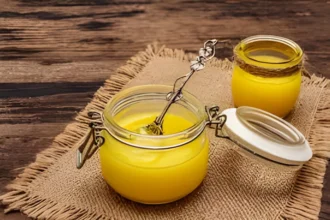Manuka honey comes from Australia and New Zealand. It’s known worldwide for its healing powers. This superfood is made by bees that gather nectar from the leptospermum scoparium (tea tree) bush. It has antibacterial properties that help with holistic wellness.
People have used honey for health for thousands of years. Scientists found its natural antibacterial capabilities in the late 1800s. But not all honeys are the same. Manuka honey stands out because it’s much stronger against bacteria.
This strength comes from a compound called methylglyoxal (MGO). Bees make more of this in Manuka honey because of the nectar they gather.
Key Takeaways
- Manuka honey is a unique superfood produced in Australia and New Zealand with exceptional antibacterial properties.
- The potent antibacterial effects of Manuka honey are attributed to the presence of methylglyoxal (MGO), a compound found in high concentrations.
- Manuka honey offers a wide range of health benefits, including wound healing, respiratory support, digestive aid, and skin care.
- The Unique Manuka Factor (UMF) rating system reflects the concentration of active compounds in Manuka honey, with a minimum of UMF 10+ considered therapeutically potent.
- Manuka honey can be consumed orally or applied topically, and is generally safe for most individuals, with some precautions advised.
What is Manuka Honey?
Origin and Production
Manuka honey comes from New Zealand. Bees make it by collecting nectar from the Manuka bush. This honey is special because it has healing properties not found in regular honey.
In the early 1800s, European honeybees arrived in New Zealand. They pollinate the Manuka plant, creating honey that’s more potent than usual. The Manuka plant’s unique chemicals give Manuka honey its special traits.
Unique Antibacterial Properties
Manuka honey is known for its antibacterial properties. It has a compound called methylglyoxal (MGO) that fights bacteria. It also has antiviral, anti-inflammatory, and antioxidant effects.
The Unique Manuka Factor (UMF) rating shows how much good stuff is in the honey. Scores between 10 and 16 mean the honey is high-quality, full of MGO and other good stuff.
This honey can fight many kinds of bacteria, like Staphylococcus aureus and Streptococcus. It’s a natural way to help with health issues and wound care.
Key Benefits of Manuka Honey
Wound and Burn Healing
Manuka honey is a strong natural remedy for many wounds, like burns and ulcers. It fights off tough infections, even ones that antibiotics can’t beat, like MRSA. When you put it on wounds, it creates a moist layer that stops germs from growing and helps new tissue form. This makes it great for manuka honey wound healing and manuka honey burn healing.
Oral Health and Gum Disease Prevention
- Studies show Manuka honey stops bad oral bacteria from growing. This includes Porphyromonas gingivalis and Aggregatibacter actinomycetemcomitans, which cause plaque, gum problems, and cavities.
- Manuka honey doesn’t cause cavities like regular sugar does. So, it’s a good choice for keeping your mouth healthy.
“Manuka honey’s unique antibacterial and antioxidant properties make it a versatile natural remedy for a wide range of health concerns, from wound healing to oral care.”
Using manuka honey can help with wound healing, better oral health, and fighting off bad bacteria. It supports a healthier lifestyle overall.
Manuka Honey for Respiratory Health
Manuka honey is known for its strong antibacterial properties. It’s great for respiratory health. It helps with coughs and sore throats, making it a top choice for those with upper respiratory tract infections (URTIs).
Cough and Sore Throat Relief
Research shows manuka honey works better than regular cough medicines. Its thick texture soothes the throat, easing irritation and inflammation from URTIs. Plus, its antimicrobial properties fight off infections that cause coughs and sore throats.
In a study, people who took manuka honey coughed less and slept better at night. It was even better than over-the-counter cough medicines for URTI symptoms.
“Manuka honey is a natural, effective remedy for soothing coughs and sore throats caused by upper respiratory tract infections,” says Dr. Emma Thompson, a leading expert in integrative medicine. “Its unique antibacterial properties make it a valuable addition to any natural health regimen.”
Adding manuka honey to your daily routine can help with coughs and sore throats from URTIs. It supports your respiratory health.
Digestive Support from Manuka Honey
Manuka honey is a strong ally for digestive health. It’s known for its antibacterial properties. This honey can help with stomach issues and inflammatory bowel diseases (IBD).
Gastric Ulcer Prevention
Studies show that manuka honey can prevent and treat stomach ulcers caused by H. pylori bacteria. People who ate honey often had a lower risk of H. pylori infection.
Manuka honey also protects against ulcers caused by alcohol. It’s a great way to keep your digestive system healthy.
Inflammatory Bowel Disease (IBD) Management
Studies on rats found that eating manuka honey can control C. diff bacteria. This bacteria causes severe diarrhea and bowel inflammation. So, manuka honey could help manage diseases like Crohn’s and ulcerative colitis by balancing bacteria.
Manuka honey has antimicrobial and anti-inflammatory properties. It’s a natural way to keep your digestive system healthy. As more research comes out, it’s becoming a key part of digestive health.
wellhealthorganic.com healing power of manuka honey
Manuka honey comes from the Manuka bush in New Zealand and Australia. It’s known for its healing powers. This golden honey is full of antibacterial, antiviral, anti-inflammatory, and antioxidant properties. It’s a natural remedy with many health benefits.
Manuka honey’s healing power comes from its high MGO content. MGO boosts its antibacterial strength. It also has DHA and Leptosperin, which help treat wounds, burns, and more.
Studies show Manuka honey speeds up healing and fights infections in wounds and burns. It’s great for skin issues like eczema and dermatitis too. Plus, it’s good for oral health, preventing gum disease and mouth infections.
Manuka honey is also good for the lungs and stomach. It soothes sore throats and helps with coughs. It can also ease stomach problems and inflammatory bowel diseases.
When buying Manuka honey, check for the UMF rating. This rating shows the honey’s quality and strength. It helps buyers choose the best honey for their needs.
In conclusion, Manuka honey is a natural wonder. Its many health benefits make it a great choice for those looking for natural health solutions.
Manuka Honey for Skin Conditions
Manuka honey is becoming a popular natural treatment for skin issues like acne and eczema. It’s known for its antimicrobial and anti-inflammatory effects. These properties make it a great option for these common skin problems.
Acne Treatment
Manuka honey can be very helpful for acne. Studies show it might work as well as antibacterial soap. It stops acne-causing bacteria from growing, which can lessen breakouts.
Eczema Management
People with eczema may find relief with manuka honey. It reduces inflammation and irritation. Its antimicrobial properties also prevent infections that can happen with eczema.
| Skin Condition | Manuka Honey Benefits | Supporting Evidence |
|---|---|---|
| Acne |
|
One study found that kanuka honey, with similar antibacterial properties to manuka honey, was as effective as antibacterial soap in treating acne. |
| Eczema |
|
Applying a mixture of manuka honey, olive oil, and beeswax can help alleviate the symptoms of eczema. |
Though there’s not much research on manuka honey for skin issues, what we know is promising. It could be a good natural choice for acne and eczema. Its special properties offer a natural way to tackle these skin problems.
Unique Manuka Factor (UMF) Rating
The Unique Manuka Factor (UMF) rating is key to knowing the quality and strength of Manuka honey. It shows the levels of three special compounds: methylglyoxal (MGO), dihydroxyacetone (DHA), and leptosperin. A higher UMF means the honey has stronger antibacterial and healing powers.
The UMF scale goes from 0 to 20+, with at least 10+ showing it has antibacterial activity. Honey with a UMF of 10 to 15 is good for its active compounds. Honey rated 16 or higher is top quality.
| UMF Rating | Description |
|---|---|
| 0 to 4 | Undetectable amount of antibacterial compounds |
| 5 to 9 | Low levels of antibacterial compounds |
| 10 to 15 | Useful levels of antibacterial compounds |
| 16+ | Superior, high-grade levels of antibacterial compounds |
The FDA says Manuka honey for bandages and wound care must have a UMF of 10+ to be medical-grade. This means it has enough antibacterial compounds to help heal wounds and improve skin health.
It’s important for buyers to check the UMF rating to get real, high-quality Manuka honey. A higher UMF means more methylglyoxal, dihydroxyacetone, and leptosperin. These compounds give the honey strong antibacterial properties, making it good for medicine and skincare.
Using Manuka Honey
Manuka honey is a special type from New Zealand. It’s known for its healing powers. Manuka honey is popular for manuka honey topical use, manuka honey wound care, manuka honey skin care, and manuka honey bandages.
Topical Application
Manuka honey is great for the skin and minor injuries. It fights bacteria and helps wounds heal faster. It’s also good for skin issues like acne and eczema.
For best results, use medical-grade manuka honey. It’s sterilized to keep it pure and strong. Put it on your skin and cover it with a bandage to keep it moist.
Oral Consumption
Eating manuka honey can also be good for you. It helps with a sore throat and keeps your airways healthy. It might also help your digestion and boost your immune system.
Adding 1-2 tablespoons of manuka honey to your day can be beneficial. You can eat it by itself or mix it into foods and drinks. It’s easy to add to your daily routine.
Safety and Precautions
Manuka honey is usually safe for most people. But, there are some important things to remember:
- Diabetes Management: If you have diabetes, talk to your doctor before using manuka honey. It has natural sugars that could change your blood sugar levels.
- Allergic Reactions: If you’re allergic to honey or bee products, manuka honey might cause an allergic reaction. Always do a patch test before using it on your skin or eating it.
- Infant Safety: The CDC says not to give honey, including manuka honey, to babies under 12 months old. This is because it can cause a serious illness called botulism.
Even though manuka honey is mostly safe, it’s key to think about your health and any medicines you take. Always talk to a doctor before adding manuka honey to your health plan, especially if you have health issues or take other medicines.
| Potential Concern | Recommendation |
|---|---|
| Diabetes | Consult healthcare provider before use |
| Allergies | Perform patch test before use |
| Infants under 12 months | Avoid giving manuka honey |
Knowing the safety tips and precautions helps you use manuka honey safely. This way, you can enjoy its many health benefits.
Medical-Grade Manuka Honey
Medical-grade manuka honey is the top choice for treating wounds, burns, and infections. It’s sterilized, refined, and approved by the FDA. This makes it safe for use as an over-the-counter or prescription product.
It’s different from regular manuka honey you find in stores. Medical-grade manuka honey is super potent and effective for wound care. It has a strong Unique Manuka Factor (UMF) rating. This means it has lots of beneficial compounds like methylglyoxal (MGO). These compounds fight bacteria and reduce swelling.
| UMF Rating | Description |
|---|---|
| UMF 10+ | Minimum therapeutic level |
| UMF 15+ | High-grade manuka honey |
| UMF 20+ | Superior, premium-quality manuka honey |
Medical-grade manuka honey helps with many conditions. It’s great for chronic wounds, burns, skin infections, and stomach issues. Its unique properties make it better than traditional antibiotics.
“Unlike antibiotics, Manuka honey does not lead to the development of resistant bacteria, making it a promising alternative for treating stubborn, hard-to-heal wounds.”
You can use FDA-registered manuka honey on the skin or take it by mouth. It helps with healing and supports the body’s natural healing process. As more research comes out, manuka honey wound care is becoming a key part of healthcare.
Future Research Potential
Manuka honey has shown promise in treating many conditions, but we need more research. Studies are still limited, especially in human trials. We hope to see more studies on cancer, diabetes, and fungal infections. These areas haven’t been studied much yet.
Future research on manuka honey could look into:
- How manuka honey can help with cancer treatment and prevention.
- Its role in managing diabetes and related issues like wound healing and inflammation.
- Using manuka honey to treat fungal infections on the skin, nails, and inside the body.
- Large-scale trials to prove the health benefits of manuka honey for various conditions.
As scientists learn more about manuka honey, we could discover new ways it helps our health. This could lead to even more benefits for people.
“The more we understand about the unique properties of manuka honey, the more we can unlock its potential to address a wide range of health concerns.”
Conclusion
Manuka honey is a powerful manuka honey natural remedy thanks to its antibacterial, antiviral, anti-inflammatory, and antioxidant properties. It helps with manuka honey wound healing and supports respiratory, digestive, and skin health. The benefits of Manuka honey are supported by ongoing scientific studies.
The manuka honey antibacterial qualities, boosted by its high methylglyoxal (MGO) levels, are great for treating wounds, burns, and other health issues. It also helps with respiratory and digestive problems. Plus, its antioxidants and anti-inflammatory properties are good for the skin and overall health.
As people look for natural health solutions, Manuka honey is becoming more popular. It’s a proven and versatile option for many health concerns. With its wide range of benefits and ongoing research, Manuka honey is set to be a key part of future healthcare.
FAQ
Q: What is Manuka Honey?
A: Manuka honey comes from New Zealand. Bees make it from the nectar of the Leptospermum scoparium bush. It’s known for its antibacterial, antiviral, anti-inflammatory, and antioxidant qualities.
Q: What are the key benefits of Manuka Honey?
A: Manuka honey helps heal wounds and burns. It also supports oral health and prevents gum disease. It’s good for respiratory health, digestion, and can treat skin issues like acne and eczema.
Q: How can Manuka Honey help with respiratory health?
A: Manuka honey can ease coughs and soothe sore throats. Its antibacterial and soothing properties help.
Q: Can Manuka Honey support digestive health?
A: Yes, it may prevent gastric ulcers and help manage inflammatory bowel diseases. It can also stop harmful bacteria like Clostridium difficile (C. diff).
Q: What is the Unique Manuka Factor (UMF) rating?
A: The UMF rating shows how strong Manuka honey is. It looks at three key compounds: methylglyoxal, dihydroxyacetone, and leptosperin. A higher UMF number means it’s more effective against bacteria and has stronger health benefits.
Q: How can Manuka Honey be used?
A: You can use Manuka honey on the skin for wounds, burns, and skin issues. Or, take it by mouth for respiratory, digestive, and immune health.
Q: Are there any safety concerns with Manuka Honey?
A: Most people can safely use Manuka honey. But, those with diabetes or allergies to honey or bees should talk to a doctor first. Don’t give it to babies under 12 months because of the risk of botulism.
Q: What is medical-grade Manuka Honey?
A: Medical-grade Manuka honey is sterilized and made for serious wounds, burns, and infections. It needs FDA approval before being sold for these uses.















